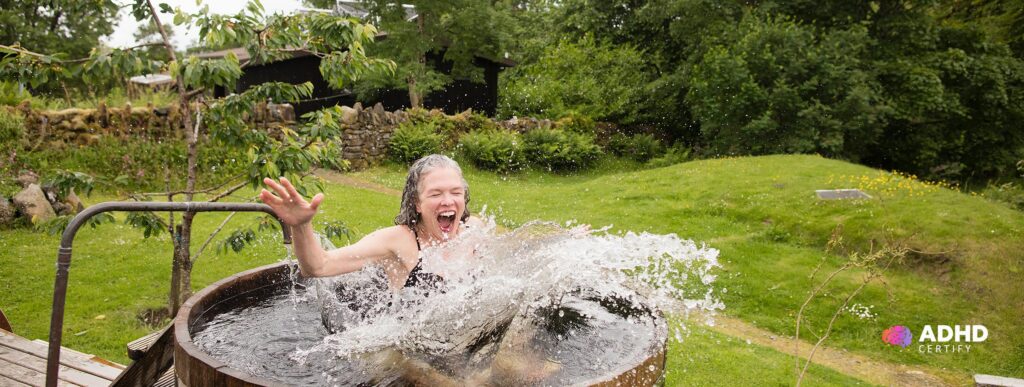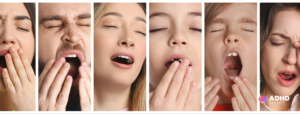There’s a new ripple stirring in the ADHD community, and it’s coming straight from an ice bath. From Reddit threads to biohacking podcasts, people are talking about plunging into freezing water, and not just for the rush, but as a possible tool for managing attention and emotional regulation.
The idea of ADHD cold water therapy is picking up steam, but does it actually work?
Can something as simple (and intense) as a cold shower shift the needle on focus, anxiety, or impulsivity?
And how exactly are ADHD and ice baths even connected?
This article cuts through the frosty hype and looks at what science and real-life stories are saying. We’ll discuss the brain chemistry behind cold exposure, explore how it might support symptom relief, and look at what’s realistic (and what’s not) when it comes to using cold as a natural way to manage ADHD symptoms.
How Cold Water Affects the ADHD Brain
Scientists and sensory seekers alike are beginning to map how cold exposure affects the neurodivergent brain. For people with ADHD, three key chemicals are in focus:
- Norepinephrine
- Dopamine
- Cortisol
Here’s how norepinephrine, dopamine, and cortisol respond to cold exposure.
Norepinephrine: How Cold Water Amplifies Alertness in ADHD
Cold water triggers a sharp rise in norepinephrine, a brain chemical often low in people with ADHD. This surge boosts alertness, focus, and mental clarity. Some studies show that cold immersion triggers a significant increase in norepinephrine levels, reflecting heightened sympathetic nervous system activity.
That might explain why people describe a cold plunge as hitting the mental reset button. It’s one of the clearest benefits of cold exposure for ADHD brain function, even if the effect is short-lived.
Dopamine: How Cold Exposure Supports Emotional Balance
Dopamine is central to ADHD. Low levels are tied to impulsivity, poor reward processing, and emotional swings. Cold exposure has been shown to gradually raise dopamine, helping to improve mood and motivation.
While it doesn’t rival medication in strength, it may offer a subtle lift for those looking beyond pharmaceuticals.
Cortisol: How Regular Cold Exposure Soothes Overactive Stress
Cortisol, the body’s main stress hormone, is often out of sync in ADHD, especially in the evening. Cold exposure, when practiced regularly, appears to reduce baseline cortisol levels over time. This may help build emotional resilience and reduce overreactions to everyday stressors.
Although more research is needed, this stress-regulating effect is a promising area in understanding and utilising the benefits of cold exposure for ADHD brain regulation.
Anti-inflammatory Effects and Brain Plasticity
There’s more to cold exposure than just a chemical rush. Beneath the surface, it may also be helping the brain in slower, deeper ways, especially for those living with ADHD.
Inflammation and the ADHD Link
Chronic low-grade inflammation has been linked to ADHD. Elevated markers like interleukin-6 (IL-6) and TNF-α appear in some individuals, potentially influencing mood and cognition. While the exact connection is still under study, reducing inflammation could support better emotional balance.
Regular cold exposure may help.
It’s been shown to lower systemic inflammation by improving vagal tone and calming overactive stress responses. For those exploring alternative approaches, cold water therapy for ADHD may help regulate immune activity that could be intensifying the ADHD symptoms.
Cold Shock Proteins and Neuroplasticity
Cold exposure triggers the release of cold shock proteins, which are molecules that protect the body during sudden drops in temperature. One, called RBM3, has been linked to brain plasticity.
Animal studies show RBM3 may help regenerate synapses, particularly in areas tied to learning and memory. While early, the idea that cold can support neuroplasticity is gathering interest.
For people with ADHD, this could mean stronger learning habits and more flexible thinking over time.
Early Signals, Not Final Proof
Most findings come from early trials and animal models. Still, initial human reports suggest cold exposure can boost mood and cognitive performance. While cold water therapy for ADHD isn’t a cure, its potential role in long-term brain support is worth watching.
What Real People Say About ADHD and Cold Water
Beyond the research papers and neurochemical theories, there’s a growing wave of lived experience shaping the story. From Reddit threads to ADHD-specific Facebook groups, people are experimenting with cold water routines and sharing their results with real honesty.
“It Feels Like a Mental Reset”
One Reddit user described their post-ice bath clarity as “a full system reboot,” saying it helped them stop spiralling through their morning distractions. Another noted, “It helps my emotional control. I still feel the frustration, but I don’t get hijacked by it.” These kinds of statements are surprisingly common, especially from adults who have struggled with traditional therapies or stimulant side effects.
Themes That Keep Reappearing
Among those who have tried it consistently, certain patterns keep surfacing. Many report sharper focus in the hours after cold exposure, particularly in the morning. Others say they fall asleep faster and wake up with more energy. Some even use cold water as a pre-task strategy, treating it as a tool to break through inertia and get moving.
For a neurodivergent brain that struggles with transitions and time management, that is no small win.
Routine is another recurring theme. The discipline of cold water, whether in the form of a brisk shower or a three-minute plunge, gives structure to the day. Several people mention using it as an “anchor habit” to help stabilise their ADHD routines.
Not a Miracle for Everyone
It is important to acknowledge the full picture. Some individuals find cold exposure too overwhelming or sensory-intensive. A few report feeling more agitated afterwards, particularly during the early stages of experimentation. It is not a one-size-fits-all approach, and comfort thresholds may vary.
Still, the number of positive anecdotes is hard to ignore. From emotional flexibility to daily rhythm, ice baths ADHD benefits seem to show up in a variety of ways, even if just as a supplement to other supports.
How to Safely Use Cold Therapy for ADHD?
Cold therapy can be powerful, but it needs a gentle introduction.
Start with a 10-second cold rinse at the end of your shower, then slowly increase over days or weeks to up to 2 minutes. Once your body adjusts, you might move on to full cold showers or short ice baths.
This slow approach respects sensory thresholds and is one of the more accessible natural ways to manage ADHD symptoms.
Breath control is essential.
Cold can feel overwhelming at first, and that’s where breathwork comes in. Slow, steady breathing helps calm the nervous system and reduce the body’s stress response. The Wim Hof Method has made this approach especially popular, encouraging people to practise controlled breathing before getting into cold water.
By lowering your heart rate and calming your system in advance, you’re better prepared for the moment of shock when the cold hits and your survival instincts kick in. Some people also find it helpful to start with partial exposure, like keeping hands or feet warm, to stay within their sensory comfort zone.
It is important to note that cold immersion is not for everyone. People with cardiovascular issues, Raynaud’s syndrome, sensory processing differences or those taking stimulants should consult a doctor before starting. With proper care and guidance, cold exposure can safely complement an ADHD care plan.
Can Cold Water Work with Other ADHD Treatments?
Cold water therapy works best as part of a larger toolkit.
Some people find it boosts the effects of stimulant medication, offering clearer focus or smoother mood regulation between doses. This potential, should only be explored with medical supervision.
It also pairs well with regular exercise, mindfulness and structured routines. For many, cold exposure becomes a physical anchor that adds rhythm to the day. When timed carefully, especially in the evening, it may also help with sleep by reducing cortisol and signalling wind-down.
ADHD and stress reduction through ice baths is not a standalone fix. But as part of a broader support system, cold exposure may offer a reliable nudge toward focus, calm and emotional balance.
Final Thoughts
ADHD cold water therapy is not a cure, but it may offer meaningful support for symptom management, especially when combined with other tools like medication, routine and mindfulness.
Early findings suggest that cold water therapy for ADHD could improve focus, emotional control and stress regulation. Personal stories often describe ADHD and ice baths as a kind of reset, a way to feel calmer, more alert or simply more in control.
These experiences are promising, but results vary, and more research is needed to fully understand the impact.
For those curious to try it, start gently and stay consistent. Cold showers or brief immersion in cool water can be a manageable way to explore whether this practice fits into your ADHD routine. Over time, it may support better focus, more stable mood and reduced reactivity to stress.
Not sure where you stand with ADHD?
Take a free ADHD self assessment to better understand your profile and next steps.
Frequently Asked Questions
What is cold water therapy and how might it help with ADHD?
Cold water therapy refers to practices like cold showers or ice baths that expose the body to low temperatures for brief periods. This exposure triggers a release of neurotransmitters such as norepinephrine and dopamine, which are often underactive in individuals with ADHD. These neurochemical changes may help improve focus, reduce impulsivity, and enhance mood regulation.
Does cold exposure help improve focus in people with ADHD?
Yes, short-term studies and anecdotal reports suggest that cold exposure may improve attention by increasing norepinephrine levels. Some people with ADHD describe experiencing a brief window of enhanced mental clarity and reduced distractibility after a cold shower or plunge. However, effects are often temporary and vary between individuals.
Can ice baths reduce stress or anxiety in ADHD?
Regular cold exposure appears to downregulate baseline cortisol (a key stress hormone) over time. This may help individuals with ADHD feel calmer, more emotionally regulated, and better able to handle daily stress. Some users also report fewer emotional outbursts and better stress recovery after consistent cold therapy practice.
Are there risks of using cold water therapy for ADHD?
Yes. Cold water immersion can pose health risks, especially for people with heart conditions, Raynaud’s syndrome, or sensory sensitivities. It may also feel overwhelming for those prone to anxiety. Always start with mild exposure (cool showers) and consult a healthcare provider before starting, especially if you are taking stimulant medication or have underlying conditions.
How often should someone with ADHD do cold water therapy?
There is no universal protocol, but many practitioners recommend starting with brief cold showers (30 seconds to 1 minute) a few times per week. The shower is mainly a starting point, gradually increasing to daily cold exposure, such as ice baths, can offer more noticeable effects. Some studies even explore the difference between morning and evening use, suggesting timing might influence outcomes. Consistency matters more than intensity, and it’s best paired with other supportive routines such as sleep, nutrition, and therapy.
Can cold therapy replace ADHD medication?
No. Cold water therapy is not a replacement for prescribed ADHD treatment. However, it may work alongside medication and other therapies to enhance symptom management. Some early studies suggest cold therapy may allow for lower medication doses in certain cases, but this should only be explored under medical supervision.
What is the best time of day to try cold water therapy for ADHD?
This depends on the individual. Morning cold exposure helps kickstart the day with improved focus and energy, while evening sessions may support sleep if timed several hours before bed. People with ADHD often benefit from using cold exposure as part of a consistent daily routine.
If a full cold plunge isn’t possible in the morning, even dipping your face in a bowl of ice water for 5–10 seconds at a time (repeating 3–5 times) can help. It’s a simple method to wake up the nervous system, many find it more energising than coffee, without the crash later.

Adam Carter
Author
Adam Carter is a neurodiversity advocate and experienced content writer for ADHD Certify. With a professional background in education and over a decade of personal experience living with ADHD, Adam writes with deep empathy and insight. He is passionate about creating content that resonates with others on similar journeys, offering clarity, encouragement, and hope. In his spare time, Adam enjoys cycling, gardening, and experimenting with new recipes in the kitchen.
All qualifications and professional experience mentioned above are genuine and verified by our editorial team. To respect the author's privacy, a pseudonym and image likeness are used.




